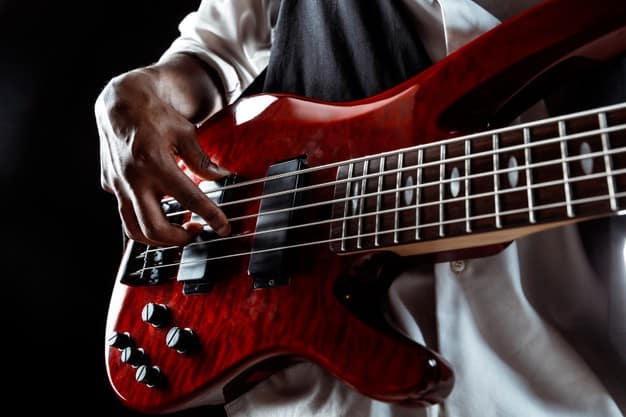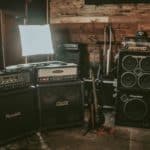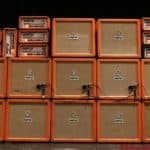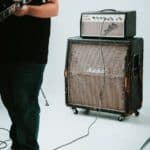We, guitar players, are very curious beasts and we would never turn down the chance to toy with a bass at home if it’s offered to us.
Whether a friend left their 4 string instrument at your home, or a deal found you and you had to buy that bass, sometimes we end up with an instrument we don’t have the correct gear to play properly.
A first impulse would be plugging it directly into our guitar setup but on second thought maybe that’s not right.
So, to go to the main topic of this article, can you plug a bass into a guitar amp?
You can plug a bass into a guitar amp normally, however, there is a risk of damaging it if you play at high volumes. The tones you will get will lack in low end and sound very aggressive. This would be great for metal players. I recommend you only use affordable practice guitar amps to do this.
If you want to stick with me for a bit longer, in this article I will try to answer the main questions you might have about playing the bass at home.
After reading this post you will have a clearer idea about the dos and don’ts when coupling bass with guitar gear.
Are you ready to get started?
Let’s go!
Why are bass and guitar amps different?
Guitar and bass are similar looking, but actually pretty different.
The main thing that sets them apart, as you could imagine, is the range of pitches each can achieve. The guitar is an instrument that dwells mostly in the mid-range, while the bass… Well… You know.
A different focus on the frequency spectrum means, undoubtedly, different specs.
Of course, the base technology is the same; both kinds of amps and instruments work with the same principles, however, each kind of amp is tweaked to better deliver for the instrument they serve.
How are bass and guitar amps different?
The main differences between bass and guitar amps are the speaker sizes, the wattage, the range of frequencies they better serve, and their features. Even the looks, if we get picky. These 2 kinds of amps have their unique feel and are tweaked to do just one job.
Let’s now run each of the main differences so you can know why manufacturers just don’t make the same amp for every instrument.
Speaker size
Low frequencies require bigger speakers to be clearly defined. This has to do with the amount of energy and air displacement needed to generate their wavelengths. I would not go further into detail to not bore you.
What is important to know, is that, although bass speaker cabinets do use small speakers commonly, these are built to withstand the rumble of the lower frequencies. Also, it’s very usual to pair them with subwoofers. These are very big speakers that focus exclusively on the lowest end of the sound spectrum.
A normal bass rig might use a set of 10-inch speakers and a gargantuan 15-inch subwoofer.
Guitar amps usually get paired with 12-inch guitar speakers that are built to focus natively on the mid-range.
Wattage
The power output of amps is measured in watts. This measure is relevant for the determination of the loudness a piece of gear can generate, however, it’s not the only feature in the equation.
Also, a common misconception is that, for instance, twice the watts means twice the volume. This is wrong. The relationship between wattage and volume is not linear. A 100-watt amp is usually only twice as loud as a 10 watt one.
Had these points been made, a big difference between guitar and bass amps is their power output in watts. Guitar amps usually have lower power outputs, while bass amps have noticeable higher watt numbers.
The thing is that the perceived volume between them is not so different. A 500-watt bass amp might feel just as loud as a 100-watt guitar amp.
We, humans, are more sensitive to higher frequencies, this is why we need that extra oomph to sense the loudness of a bass guitar. This is an evolutionary treat, our cavemen ancestors survived by being more reactive to higher pitches, which usually meant imminent danger.
Range of frequencies
The range of frequencies these 2 kinds of amps are prepared to deliver are obviously very different. There will be different cut-off points for the low and high ends where no sound passes. These are called high and low pass filters.
EQ will work differently also. The mid-range of a bass guitar will be around the low end of a guitar. The points in the curve that the controls of each kind of amp tweak will better suit the instrument the amp is designed for.
Natural compression will also be a nuance. Surely there is a different range of frequencies compressed with varying intensity between different instrument amps.
Features
Guitar amps tend to have more features than their bass relatives. This is because it’s very usual for players to use the distortion that they can generate while bassists tend to look for it in pedals.
Bass amps usually don’t come with added effects such as reverb or tremolo since they are not that commonly used.
Do guitar and bass use the same cables?
Yes, guitar and bass guitars can be plugged into an amp or console using the same kind of cables. There is a slight technical nuance, however, the capacitance. Most players won’t even hear the difference, but some might argue that basses with passive pickups will sound thicker with higher capacitance cables.
What are the risks of playing bass through a guitar amp?
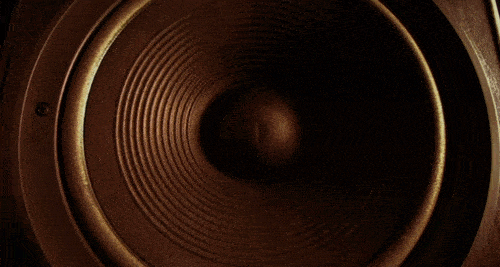
The main risk when playing bass through a guitar amp is damaging the speaker or even the amp itself. Guitar speakers are not prepared to deliver the lower frequencies a bass can produce. At high volumes, they could break. The rattling of these lower sounds can also damage the internal components of the amp.
The degree of risk is relative, though, and it will depend mostly on the volume and secondly on the kind of amp you are operating through. There are ones tougher than others, however, counterintuitively, more expensive guitar amps will be more delicate.
And also I think there is not much info about what would happen when pushing a bass signal through a 10k dollar guitar rig because no one is that crazy.
How to know if an amp is for guitar or bass
The easiest way to know is to just look up the model name online. Really.
An alternative would be by paying attention to the details I mentioned before about what makes them different.
You could help your intuition by looking at the speaker sizes, the wattage if it’s written somewhere, the features, and even things as a B in the model name.
Also, many bass amps look slicker, smaller, and more modern than guitar amps.
What kinds of guitar amps are ok to use with a bass?
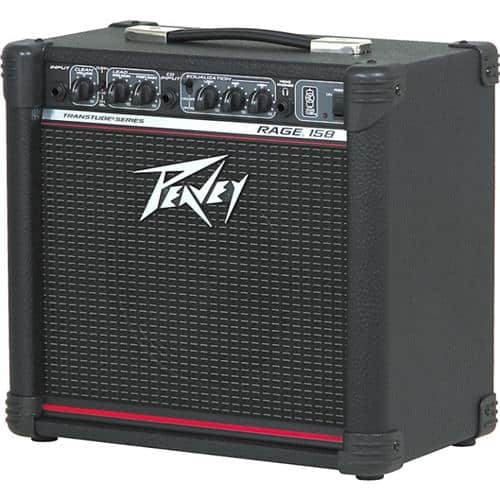
There is actually not an industry standard or a golden rule to answer this question, however, in my experience, I would only use entry-level guitar amps with a bass guitar.
To give you a more specific list:
- Cheap guitar amps
- Solid-state guitar amps
- Combo amps
- Digital amps
- Guitar preamps that don’t have a speaker attached
- Hybrid guitar and bass amps like the Peavey Vypyr
What kinds of guitar amps are NOT ok to use with a bass?
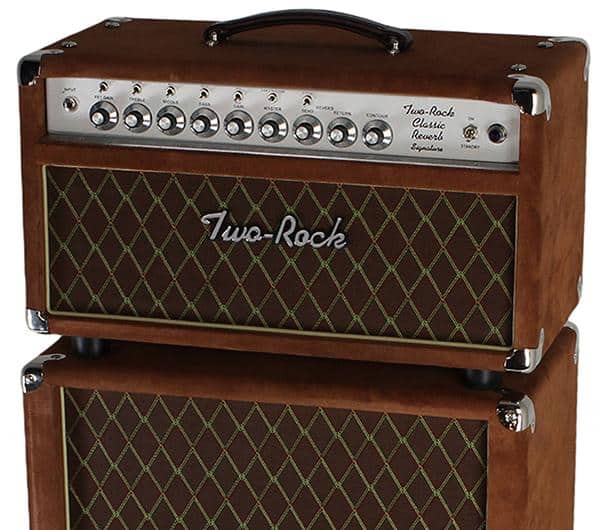
Any reasonable player would refrain from plugging their bass into anything expensive. I would argue that any guitar player with a valve amp would probably know better than sending a bass signal through it.
However, maybe you are a friend or relative of that player, and you have their beloved amp at your disposal and home.
Please be extra careful.
As I mentioned earlier, even if the speakers take the beating, the rattling of the lower frequencies might break internal components such as connections or even tubes.
A specific list of where not to plug your bass in would be:
- Expensive guitar amps
- Tube guitar amps
- Half stack amps
- Vintage guitar amps
- High output guitar amps
- Any guitar amp you don’t want to risk breaking
How to protect your guitar amp if you are plugging a bass into it
There are a few things you can do to minimize the chances of damaging a guitar amp when plugging a bass into it. The main thing I would recommend is to always play at low volumes, to don’t ever push the speaker. I would also turn down the bass control all the way to try and cut those resonant low frequencies.
Another thing I would recommend is using the amp’s clean channel and adjusting the tone knob on your instrument until you find a sweet spot with enough mids and treble.
If your bass has active pickups you could also cut the low end from the built-in controls.
Can you play a bass gig with a guitar amp?
I would not recommend playing bass through a guitar amp at gigging volumes. You will be risking damaging the amp’s speakers and their internal components due to the rattling. If there is a PA system, the wiser choice would be to send your signal through it.
Having said this, if you look around on the internet you will find stories of bass players that had to gig with guitar Marshall half stacks that survived the experience.
It’s not guaranteed that a guitar amp would explode if you crank it while playing bass through it, but it’s not recommended by anyone.
Can you play a bass gig without an amp?
Yes, you don’t need a bass amp to play bass gigs. The most common alternative is connecting to the house PA system through a console directly. You could also go through effects or digital amp simulations before doing so. A bass guitar would not sound as dull as a guitar would when plugged into a direct box.
If your instrument has active pickups you would even have the means to tweak your EQ without an amp.
Can you get good bass tones with a guitar amp?
It is hard to get nice bass tones when playing through a guitar amp. These amps are not built to deliver a thick low end with the correct kind of treble. Unless you are playing metal, a guitar amp will not give you the tone you have in your mind. For metal, you will lack lows, but have the aggression.
There is not much you could about this. It is a physical limitation.
I would say, nevertheless, that combining a bass amp with a guitar amp, if you can, somehow, split your signal might give you some very unique tones that are worth investigating.
Are there any bass players that use guitar amps?
There are many bass players that choose guitar amps to get a unique tone. Maybe the most famous was Lemmy Kilmister from Motorhead who was known for pairing his Rickenbacker bass with Marshall tube amps to get a face-melting tone.
Are there amps that work well for both guitar and bass?
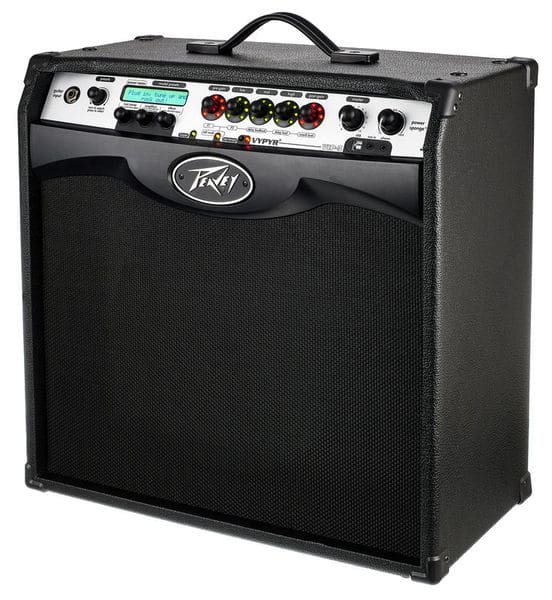
If you are looking for an amp that would be ok for guitar and bass, the Peavy Vypyr VIP 3 would do the trick. This is a digital amp, with a bass preset, that comes with a guitar speaker that can pull of some lower frequencies. However, the power output is not enough to consider it a viable gigging option.
If you are looking for no more than a nice practice amp, I strongly recommend it. However, if you are looking for something that would deliver the nicest tones or be great for gigging, you should pass on it.
The sad truth is that there is not actually an amp that could pull off both great guitar and bass tones, and it’s mainly a shortcoming from the speakers.
I will discuss alternatives further, but just as a teaser, you could look for a full-range speaker and use a multi-effect pedalboard as your amp simulator.
Cheap bass amps to practice at home
Perhaps if you have taken the effort to read until this point of the article, it means that you are really into bass and you would not stop until you find an alternative that suits you.
If you have some extra money, why not look for an affordable bass practice amp and leave your guitar one alone?
Here are my 3 top choices for bedroom practice bass amps:
Ashdown Studio-8
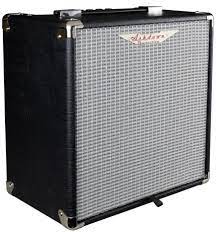
If you are a guitar player, Ashdown would surely not ring any bells, however, among the bass community, their amps are very well known. The Studio-8 is lightweight, has a headphone out, and is very cheap. The brand is reputable as I mentioned and it sounds ok. Give it a try if your local music store has one in stock.
Orange Crush Bass 25
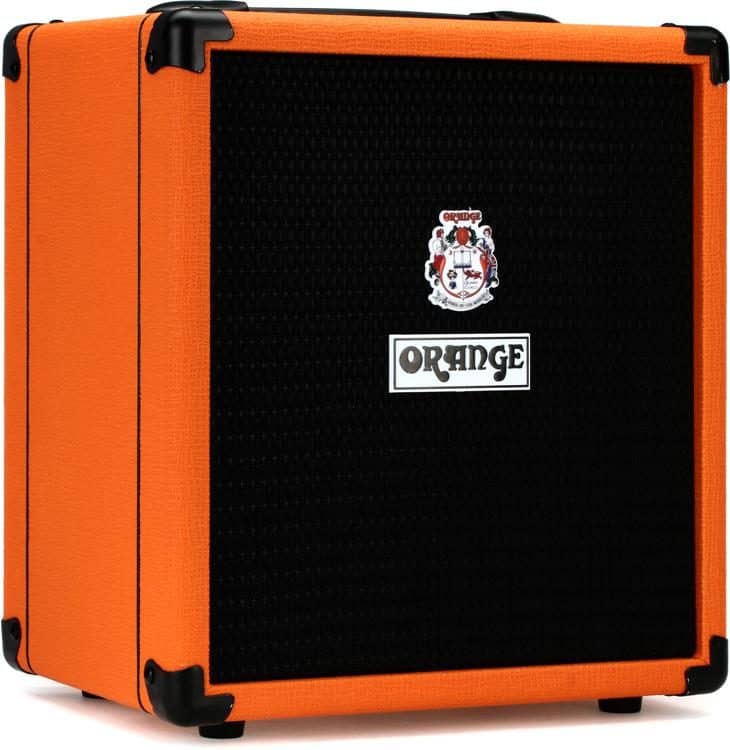
If you are looking for an amp that takes a beating and responds gracefully, this is the one for you. The Crush is not the cleanest out there, but when pushed a bit it offers very warm overdriven tones that any player would enjoy. It comes with a built-in tuner and headphone output.
Ampeg BA110V2
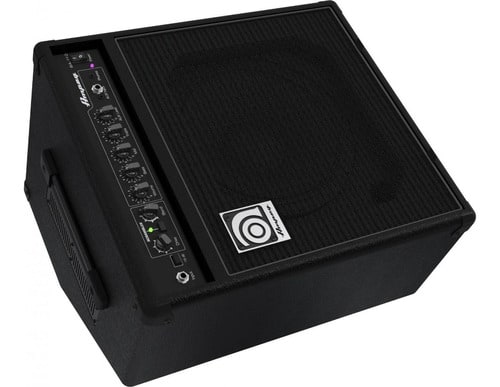
Ampeg is probably the most sought-after bass amplifier brand. Why shouldn’t you be getting one of these? The BA110 is an affordable combo that maintains the brand’s sonic identity. It has an overdrive circuit with blend control, and the ability to be tilted and pointed upwards as a stage monitor. Of course, it comes with a headphone output and it fits the price range for a nice home practice amp.
Do all bass guitars need an amp?
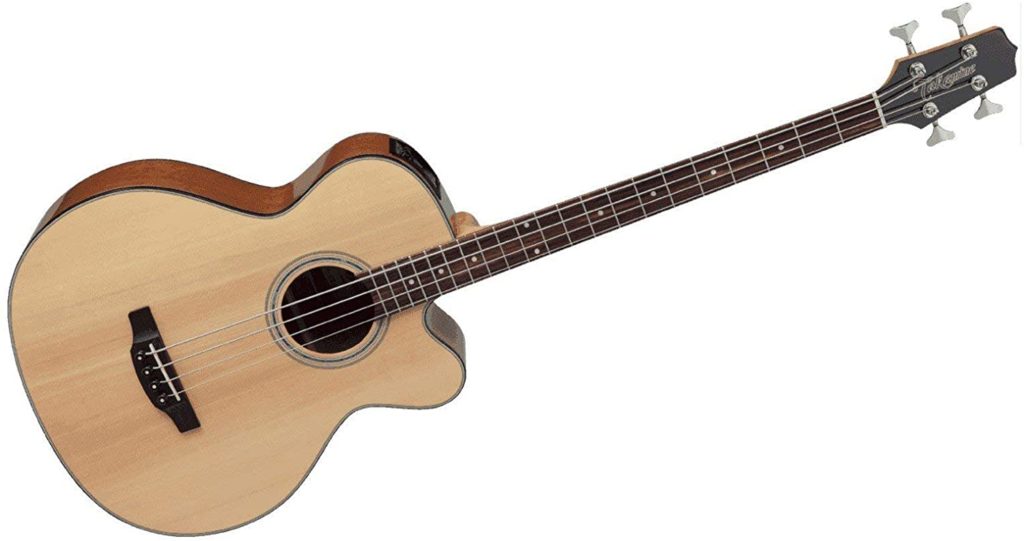
Not all bass guitars need an amp. There are acoustic bass guitars that work just as any acoustic guitar would. There are also electro-acoustic bass guitars that can be plugged into an amp or PA system.
This might be an interesting alternative for those wanting to get their hands on a bass guitar but not wanting to commit to the full gear purchase.
Obviously, there is also the double bass, the classical acoustic string instrument that’s so famous in jazz circles, but it’s not a bass GUITAR. I would also consider it an alternative, though, since it has the same function in a band.
Alternatives for practicing electric bass at home without an amp
If your budget does not allow for the purchase of a practice amp for your bass adventure, there are a few alternatives that come to my mind so that you could fulfill your guitar cheating desires.
Micro amp
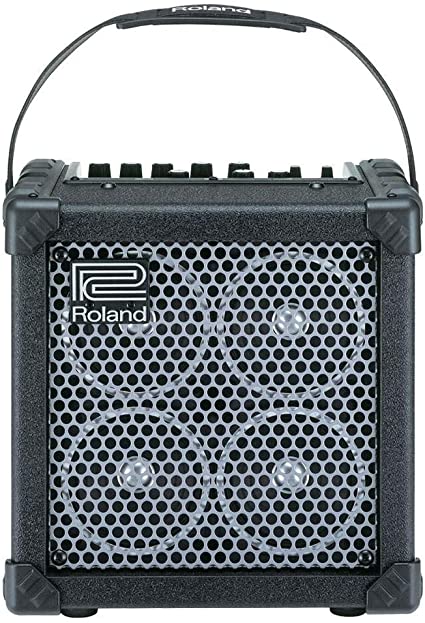
Micro amps are extremely small and portable amps. Yes, these are amps, but they are cheaper and smaller. They sound awful, especially for bass, but hey, an alternative is an alternative.
Headphone bass amps
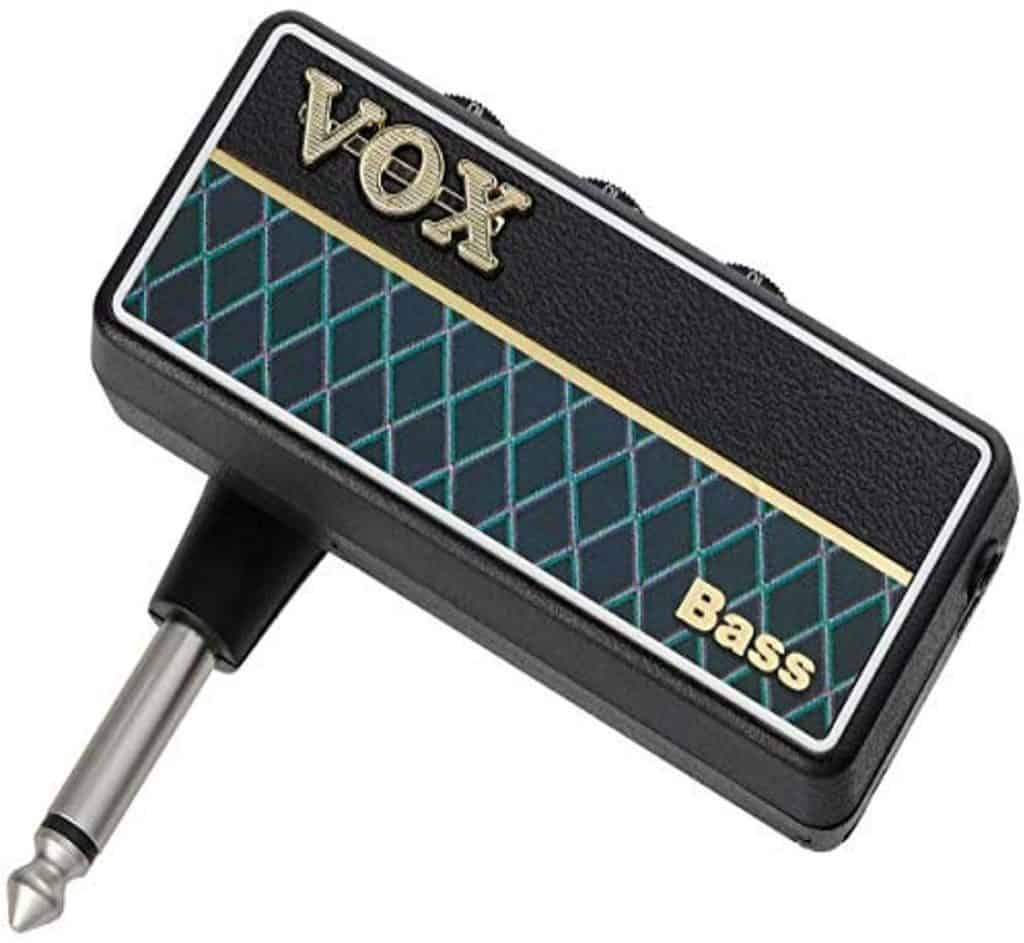
These kinds of amps such as the Vox Amplug 2 Bass just plug into your bass guitar and have a few controls to tweak. To get a sound you plug a set of headphones into them and you are ready to rock.
Phone bass interface
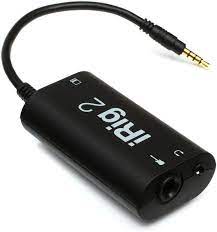
Interfaces such as the Irig are what you need to connect your instrument to your phone. On your phone, you could download some amp simulation app that would sound as good if not better than any other kind of simulation.
Computer amp simulation
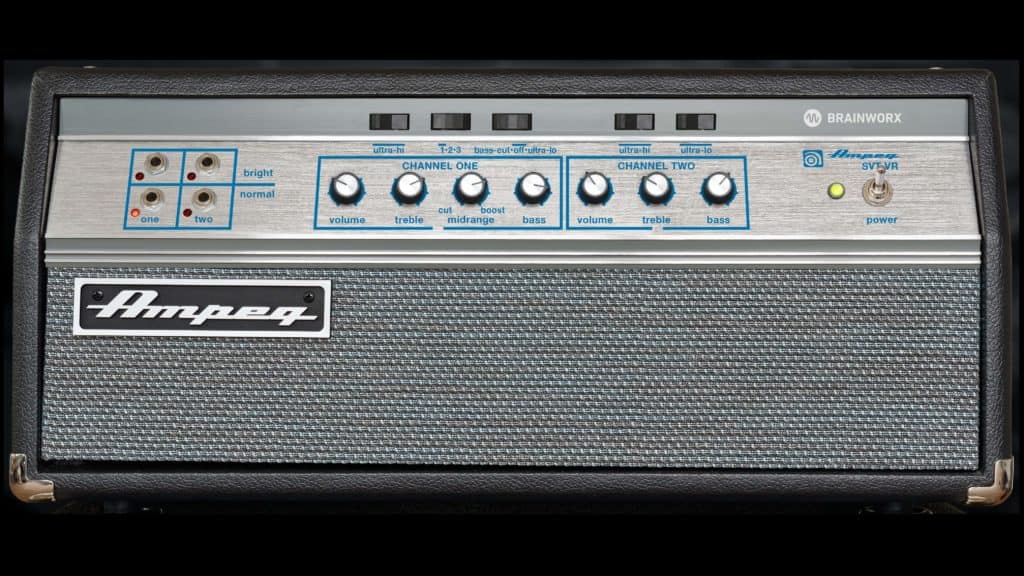
You will need an audio interface to pull this off. However, if you already have one, this might be the better alternative. When you plug your bass into your computer the options are too many. You could download a VST amp plugin to achieve amazing tones and record them straight away.
Multi-effects pedal
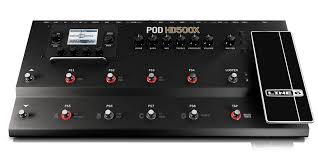
If you have a guitar multi-effect pedal laying somewhere, chances are that it has some built-in bass simulations. If you are lucky enough, this pedal will have a headphone output that will allow you to practice almost as if you had a dedicated amp for your new instrument.

Hello there, my name is Ramiro and I’ve been playing guitar for almost 20 years. I’m obsessed with everything gear-related and I thought it might be worth sharing it. From guitars, pedals, amps, and synths to studio gear and production tips, I hope you find what I post here useful, and I’ll try my best to keep it entertaining also.

